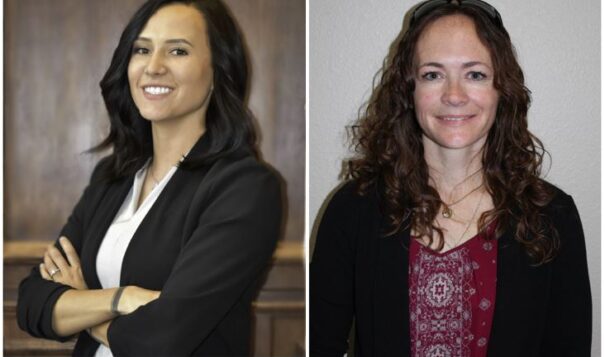News Based on facts, either observed and verified directly by the reporter, or reported and verified from knowledgeable sources.
South Dakota hires missing Indigenous, trafficking positions
 Allison Morrisette and Mary Beth Holzwarth were named Missing and Murdered Indigenous Persons coordinator and a human trafficking coordinator in South Dakota. (Photo courtesy of South Dakota Attorney General's office)
Allison Morrisette and Mary Beth Holzwarth were named Missing and Murdered Indigenous Persons coordinator and a human trafficking coordinator in South Dakota. (Photo courtesy of South Dakota Attorney General's office)
The hirings come almost two years after the Legislature created the Missing and Murdered Indigenous Persons coordinator in the attorney general’s office
RAPID CITY, S.D. — South Dakota’s attorney general on Wednesday announced that he has filled a position to coordinate efforts from state, tribal and local law enforcement agencies, as well as nonprofit organizations, to tackle alarming rates of Indigenous people going missing or having their deaths remain unsolved.
The attorney general’s office has put a new focus on crimes against Native American people, recently hiring two women to address problems Vargo described as interrelated: human trafficking and missing or murdered Indigenous people.
The state’s Native American communities suffer from what advocates describe as crisis-level rates of people going missing or killed. Currently, 57 percent of people who are listed in the attorney general’s database of missing people are Native American, despite them representing less than 9 percent of the state’s total population. It’s a problem that is not restricted to South Dakota. Tribes, federal agencies and state governments nationwide are trying to tackle a decades-long crisis of missing and murdered Native Americans and Alaska Natives.
Allison Morrisette, a citizen of the Oglala Sioux Tribe who previously worked in the Pennington County State’s Attorney’s office, will be South Dakota’s new Missing and Murdered Indigenous Persons coordinator. Mary Beth Holzwarth, who previously directed an organization dedicated to child sexual assault prevention called Endeavor 52, will be the Human Trafficking coordinator.
Vargo said they would focus on pulling together resources to address crimes that often cross tribal and state boundaries.
“No single entity or agency can solve the problems that we face,” he said at a news conference. “We all face some of the same problems and we have to face them together.”
The hirings, however, come almost two years after the Legislature created the Missing and Murdered Indigenous Persons coordinator in the attorney general’s office.
Rep. Peri Pourier, a Democratic state lawmaker who spearheaded the effort to create the position, said at the news conference that she was frustrated that it had taken so long to hire someone, though she credited Vargo with making it a priority once he was appointed to the office in June.
“I am actually glad it took Attorney General Vargo to come to the table,” she said. “This is a problem that is going to take all of us.”
Vargo has also proposed a commission, made up of advocates, state leaders and tribal officials, to advise the attorney general’s office.
The hiring delay had come under the previous attorney general, Jason Ravnsborg. He had told the Legislature that he was supportive of the position, but he had not received the funding from the Legislature to do it.
Native Hope, an organization affiliated with St. Joseph’s Indian School in Chamberlain, stepped in to fund the position with a grant for the first three years. Vargo said the funding will help the position get started and anticipated the state would fund the position after that.
Morrisette said in a statement she was determined to change how Native Americans see the state’s law enforcement.
“A lot of my relatives feel they are overlooked,” she said. “My job with the Attorney General’s Office is to ensure that is not true.”
